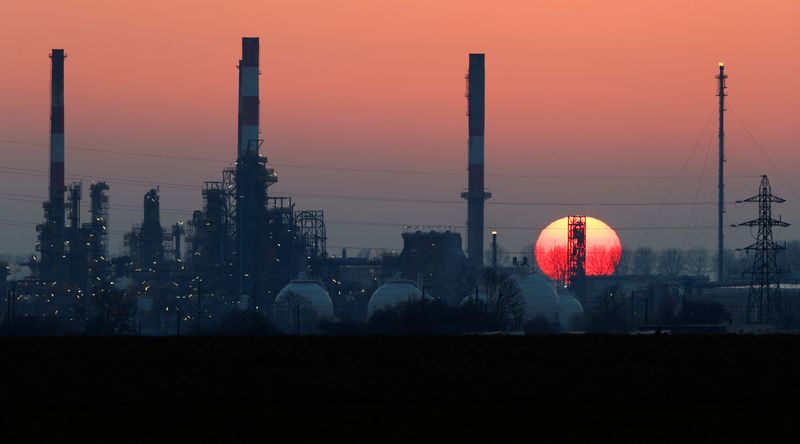By Laura Sanicola
(Reuters) -Oil prices settled lower on Wednesday, pressured by low economic activity in leading crude importer China and a surprise build in U.S. crude inventories as producers ramped up output following frigid weather this month.
Brent crude futures for March, which expire on Wednesday, settled down $1.16, or about 1.4%, to $81.71 a barrel while the more actively traded April contract settled down $1.89, or about 2.3%, at $80.55.
U.S. West Texas Intermediate crude futures settled down $1.97, or roughly 2.5%, to $75.85. Both benchmarks fell by more than $2 a barrel earlier in the session.
Manufacturing activity in China, the world's second-largest economy, contracted for a fourth straight month in January, an official factory survey showed on Wednesday.
The latest sign of the broader Chinese economy struggling to regain momentum came days after a court ordered the liquidation of troubled property developer China Evergrande (HK:3333). The real estate sector accounts for a quarter of China's GDP.
Major forecasters, including the Organization of the Petroleum Exporting Countries (OPEC), see oil demand growth in 2024 driven primarily by Chinese consumption.
"The factory data confirms our view that China, at least for now, is an impediment to global oil demand growth," said Tamas Varga of oil broker PVM.
Prices were pressured after U.S. Energy Information Administration data showed weekly crude inventories rose by 1.2 million barrels last week, compared with analysts' expectations for a 217,000 barrel draw.
U.S. domestic oil production climbed back up to 13 million bpd last week after nearly 1 million bpd of capacity was shut in during cold weather earlier this month.
Meanwhile, crude runs in oil refineries fell to their lowest level since January 2023 due to the weather, as refinery utilization rates to 82.9%, according to the EIA.
"Refiners are going to be in no hurry to rush back to levels above 90%," said Bob Yawger, director of energy futures at Mizuho.
U.S. policymakers, meanwhile, kept rates unchanged this week. Economist predictions suggested that a cut is unlikely before June, given continuing strength in household spending and uncertainty over the economic outlook.
The Israel-Hamas war has widened to conflict in the Red Sea between the United States and Iran-aligned Houthi militants.
But while that has disrupted oil and natural gas tanker shipping, which is driving up delivery costs and starting to affect oil supplies, a Reuters poll suggested that record production in the West and slow economic growth will keep a lid on prices and limit any geopolitical risk premium.
"The main issue with turning outright bullish on crude oil here is the technical picture remains bearish and is yet to catch up with recent events," including a deadly drone attack on U.S. troops near the Jordan-Syria border last week, said IG market analyst Tony Sycamore.
Yemen's Houthi group on Wednesday said it would keep up attacks on U.S. and British warships in the Red Sea in what it called acts of self defence, stoking fears of long-term disruption to global trade.
Meanwhile, Israel's offensive in Gaza persisted, though Palestinian militant group Hamas said it was studying a new proposal for a ceasefire and release of hostages in Gaza.

On the supply side, OPEC oil output in January registered the biggest monthly drop since July, a Reuters survey found, as several members implemented new voluntary production cuts agreed with the wider OPEC+ alliance and unrest curbed Libyan output.
OPEC pumped 26.33 million barrels per day (bpd) this month, down 410,000 bpd from December, the survey found. December's total strips out Angola, which has left the group.